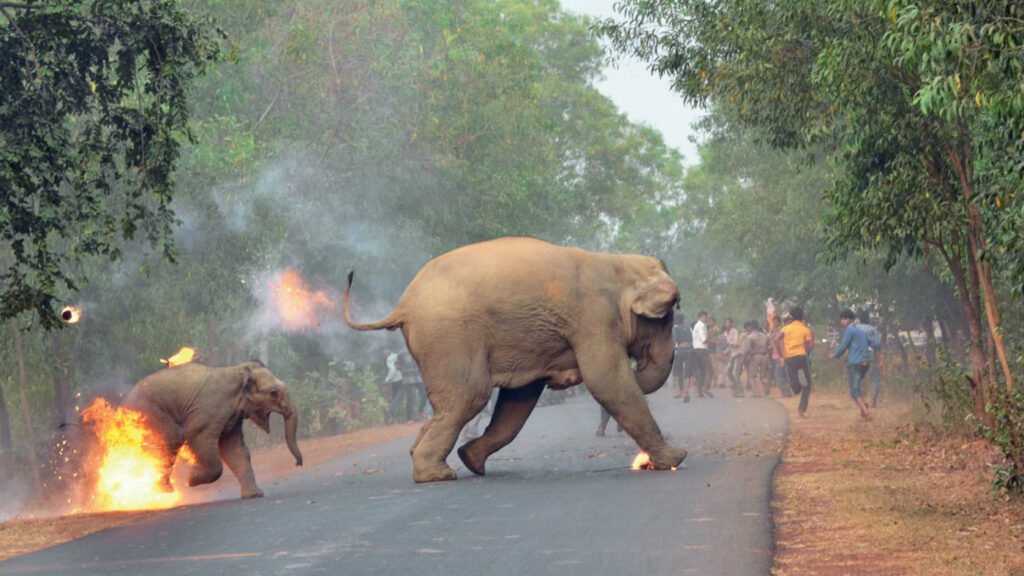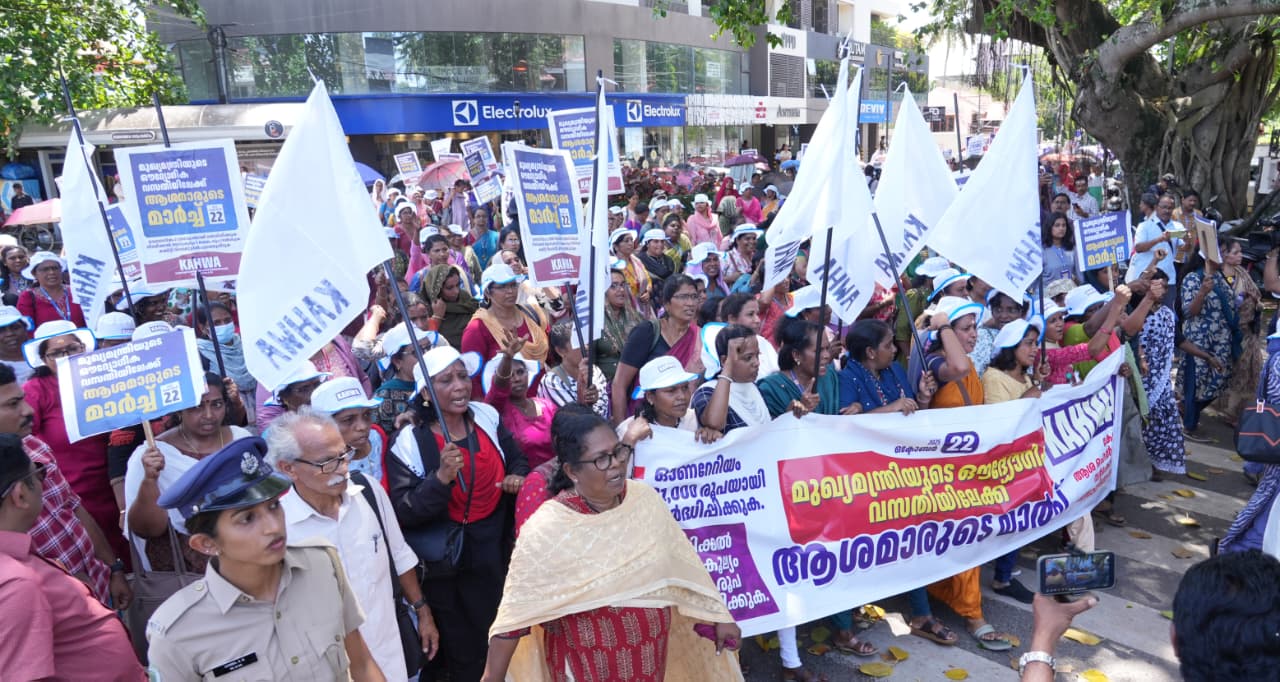[This is part of the series of analyses that Althea Women’s Friendship is circulating that takes a close and critical look at the movies by the actor Dileep so that the public memory about the atrocious exoneration of the Malayalam movie actor in the actor-assault case of 2017 by the Ernakulam Principal Sessions Court does not fade into oblivion, like so many earlier cases of patriarchal violence. On social media, the tide of anger continues to swell with the unbelievably crude mocking that Dileep engages in against the survivor in the new piece of dirt that he throws at the Malayali public, calling it a ‘movie’. This is the first segment in the series in which Gayatri Devi takes apart Dileep’s movies — and reminds us that this crime was, in a way, foretold. The signs that the depravity were there much earlier. Just that we did not see well enough.]
I belong to that group of Malayalis who have not been watching Dileep’s movies. But his notoriety as the eighth accused in a case in which an actor was kidnapped while returning from work, threatened to the point of immobilization from shock, and subjected to gang rape made me change my resolve not to watch his movies. On December 8, the Ernakulam Sessions Court acquitted him. That is but a temporary reprieve. The Kerala State’s Special Prosecutor has declared that the State will move against the verdict with an appeal at the High Court. This is very welcome indeed.
News from the world of Malayalam cinema indicates that Dileep is being protected by a section of his colleagues. It is not possible to discern the motives of these people from the news — whether it is sympathy, camaraderie, gratitude, love, respect, or fear. For example, a new movie starring Mohanlal along with Dileep has just been released — titled Bha-Bha-Ba. This is apparently an abbreviation of sorts for the Malayalam words Bhayam-Bhakti-Bahumanam (Fear-Devotion-Respect) but it sounds like the (cruel) caricature of stuttering. That makes one think that this movie must surely be about their own lives. There are many reports in the Malayalam press that point to the difficulties encountered by all individuals who attempted to challenge him and his ways. The Hema Committee Report itself mentions the split in film industry bodies like MACTA, and how technicians who questioned his ways were banned by such bodies as FEFKA and AMMA. Describing the latter issues, it mentions without naming him, the tensions between him and the directors Thulasidas and Vinayan. He emerges from these reports as a vindictive personality who would seek revenge as a way of getting past differences.
But in his movies, he is recognized as the funny guy. He employs many different vocal tones; imitates people; dresses in female clothes; delivers egregious patriarchal nonsense in ways that project it as humorous. The last type of ‘joke’ in Dileep movies has been noticed and widely critiqued. For example, the unbelievably crude and insensitive rape joke his character makes in the hit movie Meesha Madhavan — in which he sneaks up to the sleeping female lead, and says, kedanna kedappiloru rape angottu vachu thannaalondalla! Literally that means ” … and what if I shove a rape on you when you are lying here supine and senseless!” This does not make sense in English, but the emphasis is important: rape is an instrument that can be thrust at a woman when she is least anticipating it. After spitting out this filth, Dileep’s character continues his jest waddling around awkwardly saying, “In ten months, you’ll have a belly sticking out and [you’ll be moaning] Amme… Amme— caricaturing a heavily-pregnant woman walking with difficulty. This is supposedly, humour — in any case when this movie appeared in 2002, by all reports, audiences enjoyed it thoroughly, hooting and laughing in theatres. Meesha Madhavan was the biggest hit of the year. Our people, the Malayalis love rape jokes. This joke and the laughter it elicited shows that what we have here is indeed a rape culture. But it is doubtful if the scene will elicit the same kind of mirth in 2025, even though he has been acquitted in the gang rape case.
But I decided not to begin from his commercial movies, but from the ‘high cinema’ in which he has appeared. I started watching his filmography from the movie Pinneyum (Once Again) (2016) directed by none other than the leading figure in ‘high’ Malayalam cinema, Adoor Gopalakrishnan. In it, he played the role of a notorious criminal who once fascinated Malayalis : Sukumara Kurup. His notoriety stemmed from the peculiarly-cruel crime that he committed. Faking his own death for the sake of a fifty-lakh insurance payout in 1984, Kurup strangled to death in his car a man called Chacko near Karuvatta in the Alappuzha district, who had asked for a lift. He burned his body and tried to make it look like it was he who died. This crime was apparently planned by him and his family. Adoor Gopalakrishnan tries to retell the story of this warped mind as the tale of intensely-twisted love. It is one of Adoor’s least-watchable films, and the screenplay and dialogues are so bad and brash that one wonders if it were really written by Adoor at all. One would even think that the usual fare in his movies — long-drawn-out shots of women cooking and serving food to useless men who cram down endlessly — was so much better.
But then, this is indeed the same man who had the temerity to try to dismiss the critical remarks of the well-known singer and the Vice-Chairperson of the Kerala Sangeetha Nataka Akademi, P R Pushpavathi in the film conclave organised by the Kerala government early this year against his obviously-casteist claims: his actual words were, reportedly: “Who is this woman? The film conclave is not some marketplace where any woman who passes by can just step in and talk!” I fear that his wrath might land on me too. However, I am an address-less ‘just-a-woman’ and so it may bypass me.
Adoor may think poorly of marketplaces in general, but he is surely on the side of the man who holds the levers of commercial cinema in Malayalam, Dileep. After all, cinema is indeed a high-level, sophisticated market place where human beings are bought and sold. Adoor directed Pinneyum in 2016; just a year after, in the wake of the actor-assault case, he stated publicly that he believed in Dileep’s innocence. It is of course a total coincidence that Sukumara Kurup’s and Dileep’s real names are the same: if one is Gopalakrishna Kurup, the other is Gopalakrishna Pillai. Thus the movie involved three Gopalakrishnan’s. The wife of the protagonist in the movie, Devi, was played by Dileep’s present partner, Kavya Madhavan. This was her last movie; she married Dileep that year. The attack on the actor happened the next year, in February 2017. Ms Madhavan’s last outing on screen was as the wife of a notorious and unrepentant criminal. Just months later, her husband was accused of conspiracy to organise a hair-raising gang rape. What a coincidence, or maybe fate!
The court has dismissed the case against Dileep, but in the above-mentioned movie, he is indeed the master-conspirator. Though it is all highly coincidental, anyone watching the scenes in Pinneyum in which the criminal and his wife and their relatives gather around make a plan to find a dead body and burn it cannot helping thinking about the accusations against him in the 2017 case. When they watch the scenes in which they strangle Chacko to death in the car and pack straw to set him alight will surely recall the actor trapped in a moving vehicle being sexually assaulted by six thugs. (It is worth remembering that the actor-assault case differs quite significantly from the Nirbhaya case of 2012. If the latter was about a young woman mistaking an off-duty private bus for a DTC bus, this was about a young woman being trapped in the very vehicle arranged for her by her own employer. This, then, is a workplace crime). We can also hardly help remembering the testimony of the late film director Balachandrakumar who witnessed Dileep and his family members gathering together to watch the recording of the assault. “The Cruel Deeds of Pulsar Suni,” Dileep reportedly joked.
From now on, we cannot help seeing all his ‘family movies’ differently.
Of course, that raises the question whether these ‘family movies’ can be viewed within family contexts — if that means social spaces shared by people bound by love, care, notions of equal worth, and mutual respect. They are stuffed with not just cheap, salacious humour and rape jokes (as mentioned earlier) — more than that is a kind of obsession with rape that surfaces repeatedly in his movies. After Pinneyum (2016), I watched a commercial movie of his that predated it, Mr Marumakan (Mr Son-In-Law). It was released in 2012, the same year as the Nirbhaya case.
In this movie, the villain (played by Baburaj) who had a score to settle with the lead character played by Dileep, hires a thug (played by Suraj Venharammood) to rape his sister. The movie describes this as ‘quotation rape’. The thug receives his payment, touching the villain’s hand reverentially, as though to acknowledge the auspicious nature of the deal. These scenes are stuffed with filthy dialogues like: “Until now, I had to pay so that I could do this; this is the first time I am getting paid to do it!” The plan is to lure the young woman to a room in a lodge, then rape her, simultaneously inform the police of sex trafficking happening there so that the matter becomes public, and the lead character’s family drowns in shame.
The villain’s sister assists in this crime; she draws the other girl into the lodge on the pretext of introducing her to her parents. She is about to lock her in a room — when Dileep arrives and rescues her. Then, to extract revenge, he pushes the villain’s sister into the room and locks the door, knowing that the thug would soon arrive and rape her. Before he locks the door, he tells his sister to deliver a sharp slap on the other girls’ face. And smiles, seeing woman punish woman. Then he invites the villain and the local sleaze-sheets and the police to uncover the illicit goings-on in the lodge. The villain arrives, expecting to find Dileep’s sister, but finds his own sister and the thug trying to hide under the cot. Some people try to sneak away; others take photos. A girl tries to cover her breasts weeping as the cameras wink around her.
Wow, what a ‘family movie’!! But wonder if you remember any instance of ‘quotation rape’ in Kerala in the recent times?
There are bursts of laughter when Suraj Venharammood’s rapist-character appears on screen. They are our favourite jokers, aren’t they? Mr Marumakan was a bumper hit of 2012. The rapists who tore out the intestines of that young woman known as Nirbhaya and Dileep’s Mr Marumakan share something in common: the phenomenon called rape culture. Through deeds and words, characters and narrative styles, they make rape feel absolutely normal, trivial, and palatable to our sensibilities. That is what Dileep’s cinema has been doing.
Anyway, watching these two movies gave me a sense of what ‘Dileep’s cinema’ is. The man himself peeps out from behind them. ‘Dileep’s cinema’, ‘conspiracy’, and ‘quotation rape’ — these seem to be expressions made in the same breath. In his movies, he seems to have explored them quite thoroughly. This is the ‘comedy’ that has brought him wealth and fame.
I will write more about his other movies soon. Let the awful taste that these two films have left in me subside.
[Gayatri Devi is a scholar of English based in the US. She is part of Althea Women’s Friendship. Translated by J Devika.]





